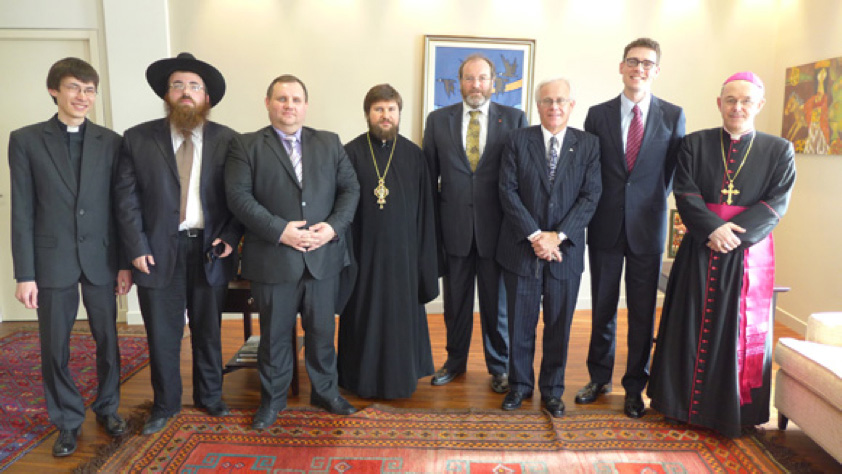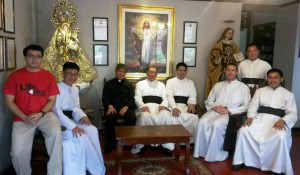For, or against the “agreements”?
A text published in Le Sel de la terre 98
Father Schmidberger, former Superior General of the Society of St. Pius X wrote arguments . in favour of the ” normalisation ” of the Society. He was chosen by the mother house to preach two priestly retreats to the French speaking priests of the Society (in August and September) at the priory of Le Pointet (France) and in Ecône, which no doubt allowed him to advance his ideas.
Elsewhere the Superior General has broken his silence in order to argue for the structure proposed to the Society of St. Pius X ( see the text reproduced below).
Father Michel Simoulin has also defended the advantages of the “agreement”.
So, is there nobody against? There is opposition of course. But the opposition is discreet and is expressed privately, as if it were forbidden today, in the SSPX, to defend publicly the position which was its official position until 2012: “no practical agreement before the conversion of the Roman authorities”.
The “super diocese” offered to the SSPX by a Pope who “wants the good of Tradition”
By Christian Lassale
This article was published by MCI-L’hebdomadaire de medias- catholique. Info n. 33 of the 8 September 2016. P.6-7
Umpteenth announcement and no real new development in the relations between Rome and the SSPX founded by Archbishop Marcel Lefebvre and led until 2018 by the Swiss Bishop Bernard Fellay
In a conference given in English on 24 August 2016, in Australia, the current Superior General of the SSPX explained to the faithful the nature of the personal prelature proposed by Rome to the SSPX. Mgr. Fellay used the occasion of this canonical explanation to give his opinion on the Roman proposal:
(….)Rome is offering us a new body. At the head a bishop. This bishop chosen by the Pope from three names which are presented by the Society and taken from the Society. This bishop will have authority over the priests, over the religious who want to be members and over the faithful. The faithful who will belong to this body will have the strict right to receive all the sacraments from the priests of the society – all the sacraments, marriage included. This bishop will have the right to have schools, seminaries, ordinations, even to make new religious congregations and to accept inside others who would like to join.
It is something like a super-diocese, autonomous from the local bishops. In other words for you no change from what you have now. The only thing is it will be with the recognition that you are Catholics.
You can imagine that that will create a lot of conflicts with the local bishops – you can easily imagine that. So we have to remain prudent, but in itself you cannot imagine anything better than what is offered there and such a thing you cannot think it is a trap. It is not a trap and if somebody offers something like that it can only be because he wishes us well. He wants the good of Tradition and for Tradition to spread in the Church. It is impossible to think that such a thing could be invented by our enemies. The enemies have many other ways to crush us but not that one.
You may say: if that is the thing, why don’t you accept? Because I want to be sure that it is true. I don’t have the right to live in a dream and so I must check each aspect (…) [End of quotation]
From a canonical point of view, there is nothing new under the sun, the above description being that of a personal prelature with extended powers such as Mgr. Guido Pozzo has already suggested (since 2012). It is moreover this possibility which was rejected by a majority of major superiors meeting in a hotel near Ecône at the end of June 2016.
The novelty of the words of Mgr. Fellay, if there is one, is found in the syllogism which completes the exposé. It is this:
… impossible that such a thing could be invented by our enemies
– so it can only be a question of friends of Tradition, and :
… if somebody offers something like that, it can only be because he wishes us well. He wants the good of Tradition and for Tradition to spread in the Church.
As a result, such a proposal cannot be but accepted, if it proves true.
In such an argument, the Tradition of the Church seems to become identified with the SSPX, since wishing well to the latter is to wish well to Tradition, notwithstanding the dramatic blows which Rome may inflict on Tradition elsewhere. The reality in the Church seems as if dissipated by these good intentions with which present day Rome seems to adorn itself.
Moreover, these good intentions, even if supposed to be completely sincere, are they enough in themselves to necessitate the acceptance of a canonical agreement in the present conditions of the Church? The benevolent intention is in no way sufficient; the propriety of the act still requires that it be, by its very nature, good.
Now how can one envisage today a concrete dependence of the SSPX on Rome, even though the highest holders of ecclesiastical authority, with the Pope in front, are the destroyers of the Church?
Living in a state of concrete dependence with regards to an authority requires one to follow the same goal, the inferior putting himself at the service of the superior in order attain it. The least that one can say, alas, is that modernist Rome does not pursue the same goal as the Church of all time or of the SSPX. Without this unity of purpose, and thus of faith, any practical agreement will prove most perilous for the SSPX. This is doubtless what the general chapter of 2006 meant when it said: “no practical agreement without a doctrinal agreement”.
(End of the reproduction of the article by Christian Lassale)
Commentary by ” Sel de la Terre”:
One can add to these remarks that Rome is not giving to the superior of the “super-diocese” the ability to designate and consecrate bishops. So it is obvious that the only bishops who will be able to succeed those bishops chosen by Mgr. Lefebvre will be those having the profile desired by ” Rome “.


